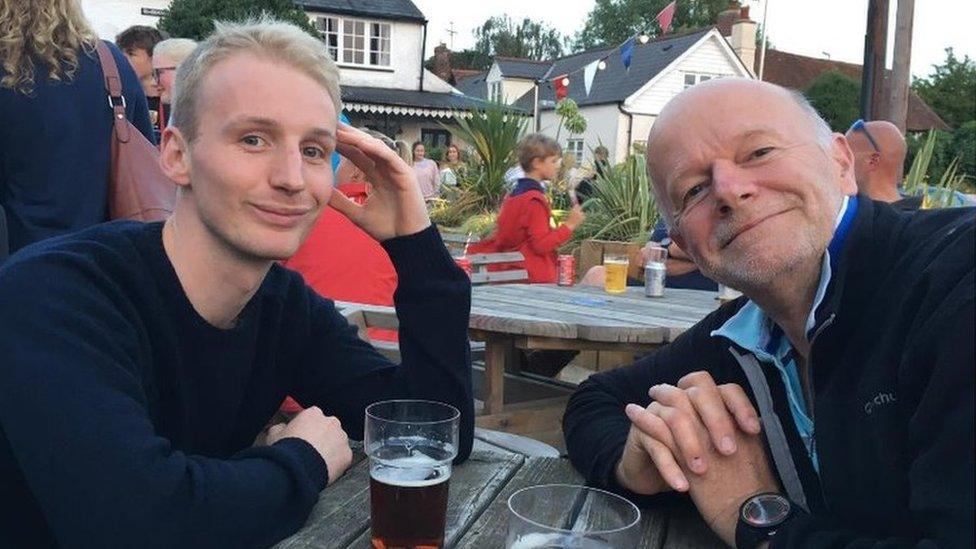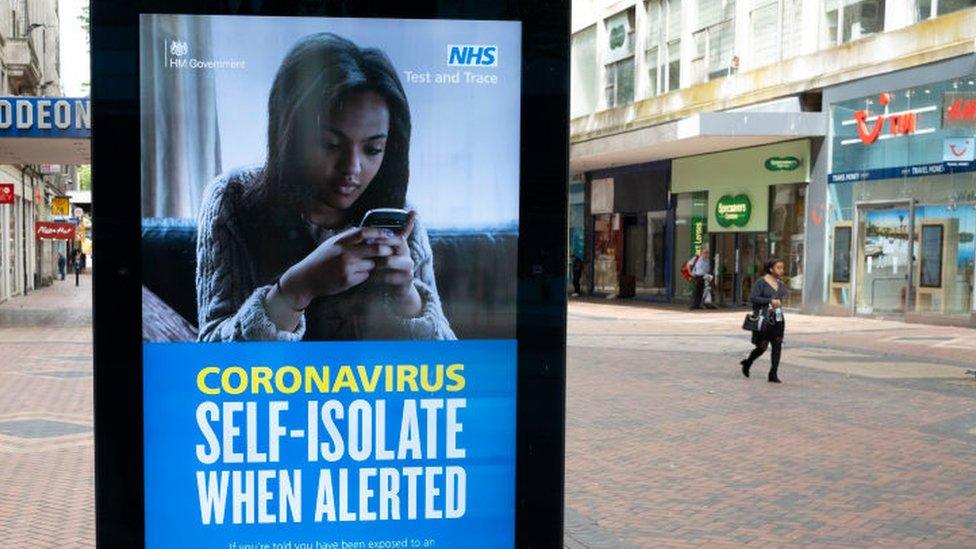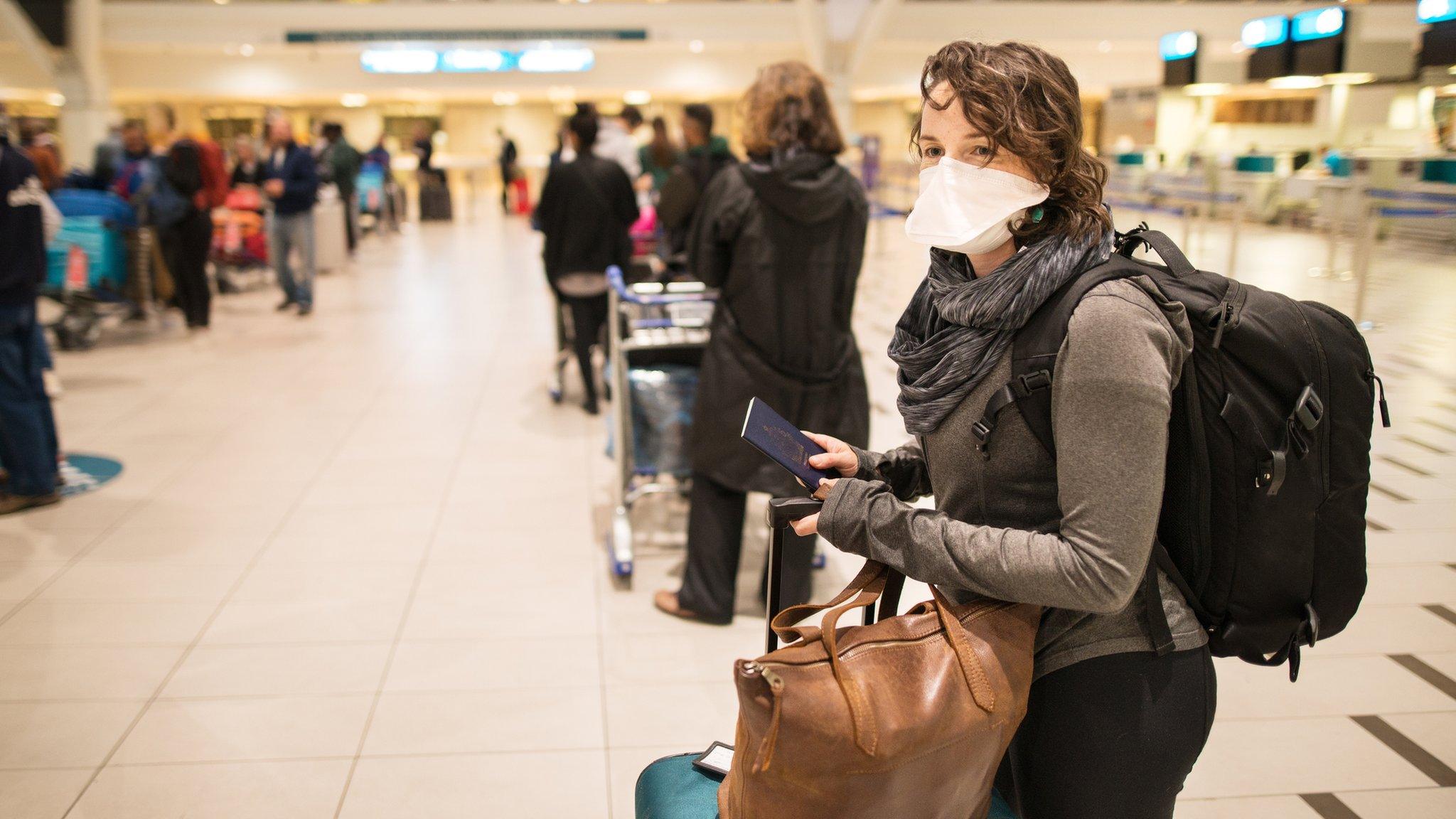Coronavirus: 'Start public inquiry now to prevent more deaths'
- Published

Jamie Brown (left), whose father, Tony, died of Covid-19 in March, wants an urgent public inquiry
Relatives of 450 people who have died in the coronavirus pandemic are demanding an immediate public inquiry.
The families want an urgent review of "life and death" steps needed to minimise the continuing effects of the virus and a guarantee that documents relating to the crisis will be kept.
A full inquiry would take place later, says lawyer, Elkan Abrahamson, who is representing the families.
The government has said its current focus is on dealing with the pandemic.
But the Covid-19 Bereaved Families for Justice UK group say immediate lessons need to be learned to prevent more deaths, and that waiting for ministers to launch an inquiry will cost lives.
The call for an inquiry comes as a report from the National Audit Office - assessing the readiness of the NHS and social care in England for the pandemic, external - has shown it is not known how many of the 25,000 people discharged from hospitals into care homes at the peak of the outbreak were infected with coronavirus.
Health and Social Care Select Committee chairman Jeremy Hunt said it seemed "extraordinary that no one appeared to consider" the risk.
The Department of Health says it took the "right decisions at the right time".
'Preventable' death
Ministers have insisted throughout that their response to the pandemic has been based on scientific advice.
But for Jamie Brown, whose father, Tony, died of Covid-19 in Colchester General Hospital on 29 March, two-and-a-half weeks after travelling into central London by train, the government's decision to lock down on 23 March came too late.
Jamie, 28, who said his father made the journey once a week at most, believes his death was preventable.
"I can't help but believe that if we'd entered lockdown sooner he wouldn't have been exposed in the way he was," he said.
Tony Brown, 65, became ill with a dry cough and a temperature on 17 March. He was bedridden but was adamant he would "wait out" the illness at home.
He appeared to be getting better but on 28 March he developed chest pains.
By the following morning his family were so concerned they called an ambulance, and soon after Tony reached hospital he had a cardiac arrest - caused by respiratory failure - and died.
A post-mortem test confirmed Covid-19 was present.
Jamie said government advice to "stay at home" meant his 65-year-old father did not seek medical help early enough.
"He was trying to wait it out and if you wait too long it turns out it kills you really quickly," he said.
He added that a detailed public inquiry into the broader handling of the crisis in the UK must eventually take place, but right now he believes it is crucial that a limited inquiry starts as soon as possible.
"We need to learn the lessons immediately from what has gone wrong to get us to this point," he said.

A SIMPLE GUIDE: How do I protect myself?
IMPACT: What the virus does to the body
RECOVERY: How long does it take?
LOCKDOWN: How can we lift restrictions?
ENDGAME: How do we get out of this mess?

The group of families, which has 450 members and is expected to grow further, is supported by the Liverpool-based law firm Broudie Jackson Canter that acted for the Hillsborough families.
Their lawyer Mr Abrahamson has backed their call for an early phase to any inquiry, with full proceedings taking place once the pandemic is over.
"What we need to look at straightaway are the issues which are life-and-death decisions," he told the BBC.
"We expect there will be a second spike. We want to know what the government is going to do when that happens."
Mr Abrahamson said an early phase to a public inquiry would also help clarify government plans for fully reopening schools and easing the lockdown and lay out the science behind these decisions more clearly.
The government has rejected calls for an early start to any public inquiry.
A spokesperson said: "At some point in the future there will be an opportunity for us to look back, to reflect and to learn some profound lessons.
"But at the moment, the most important thing to do is to focus on responding to the current situation."
Care homes
The National Audit Office's report into the readiness of the NHS and social care in England for the pandemic said 25,000 people were discharged from hospitals into care homes between 17 March and 15 April. That was 10,000 fewer than the same period last year.
"It is not known how many had Covid-19 at the point of discharge," said the report.
It said NHS England and NHS Improvement advice at the time was to urgently discharge from hospital "all patients medically fit to leave" in order to free up bed space for coronavirus patients.
The advice was changed on 15 April but the NAO noted that, as of 17 May, one in three care homes had declared a coronavirus outbreak, with more than 1,000 homes dealing with positive cases during the peak of infections in April.
It follows a separate report by care chiefs in England, who said there were "tragic consequences" of moving patients from hospitals to care homes at the start of the pandemic.
The Department of Health and Social Care said 60% of all care homes had avoided outbreaks entirely.
Mr Hunt, a Conservative MP and former health secretary, said: "It seems extraordinary that no-one appeared to consider the clinical risk to care homes despite widespread knowledge that the virus could be carried asymptomatically.
"Places like Germany and Hong Kong took measures to protect their care homes that we did not over a critical four-week period."
Latest government figures, external show another 151 people with coronavirus have died in the UK, across all settings, taking the country's death toll to 41,279.

I MAY DESTROY YOU: The next must-see show in lockdown
TRAIN WRIGHT: Mark Wright's lockdown workout


Have you been affected by the issues in this story? Please share your experiences by emailing haveyoursay@bbc.co.uk, external.
Please include a contact number if you are willing to speak to a BBC journalist.
WhatsApp: +44 7756 165803
Tweet: @BBC_HaveYourSay, external
Please read our terms & conditions and privacy policy
- Published11 June 2020

- Published1 July 2022

- Published10 June 2020
